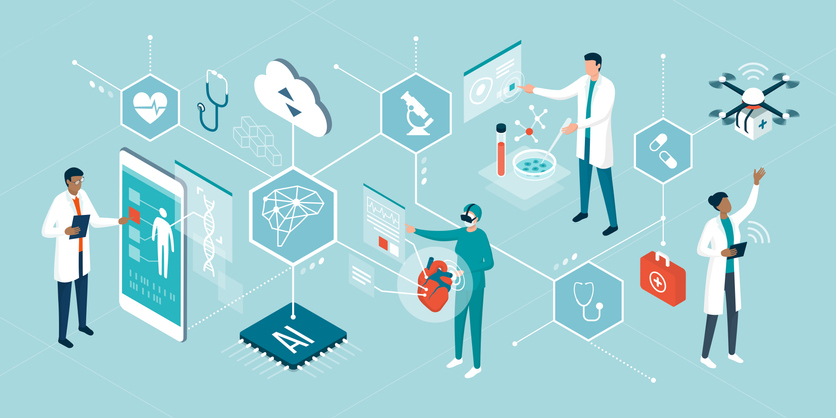Digital transformation in healthcare represents a paradigm shift, reshaping the industry in profound ways. From electronic health records (EHRs) to telemedicine, innovative technologies are revolutionizing patient care, diagnosis, treatment, and operational efficiency. This 1000-word exploration of healthcare innovations and challenges will delve into the key digital transformations, their impact on healthcare delivery, the associated benefits, and the challenges that must be overcome to ensure a brighter, more patient-centered future.

1. Electronic Health Records (EHRs)
Electronic Health Records (EHRs) have been a cornerstone of healthcare digitization. EHRs streamline the process of collecting and storing patient data, making it more accessible, efficient, and secure. These digital records improve patient care by facilitating comprehensive data sharing among healthcare providers, reducing errors, and enabling real-time access to critical information.
2. Telemedicine and Remote Monitoring
Telemedicine (An Electronic way to give Medical Assistance) has gained significant traction, particularly i the time of the COVID-19 pandemic. It enables remote diagnosis, treatment, and consultations, extending healthcare services to patients in remote areas and enhancing accessibility for all. Remote monitoring devices and wearable technologies allow physicians to monitor patients’ vital signs and health metrics, providing early intervention when necessary.
3. Artificial Intelligence (AI) and Machine Learning
AI and machine learning have been pivotal in advancing healthcare innovations. These technologies assist in diagnostics, predictive analytics, and drug discovery. Machine learning algorithms can analyze vast datasets to identify patterns and trends, aiding in early disease detection and personalizing treatment plans.
4. Internet of Things (IoT) in Healthcare
The Internet of Things (IoT) connects medical devices, wearables, and equipment to the internet, creating a vast network of interconnected healthcare tools. This connectivity allows for real-time monitoring of patients, efficient management of hospital resources, and improved data-driven decision-making.
5. Blockchain in Healthcare
Blockchain technology is being explored for healthcare applications, particularly in the secure sharing of patient data and the management of medical records. It ensures data integrity, security, and privacy, providing patients with more control over their personal health information.
6. Digital Health Startups and Innovation
The healthcare industry has seen a surge in digital health startups and innovations. These companies are introducing creative solutions, such as telehealth platforms, healthcare apps, and wearable devices, to enhance patient engagement, preventive care, and overall well-being.
7. Benefits of Digital Transformation in Healthcare
The digital transformation of healthcare offers a multitude of benefits:
- Improved Patient Care: Digital records, telemedicine, and remote monitoring enhance patient care, accessibility, and outcomes.
- Efficiency and Cost Reduction: Digital systems streamline administrative tasks, reduce paperwork, and minimize duplication, resulting in cost savings.
- Data-Driven Insights: AI and machine learning enable data analysis, providing insights for evidence-based decision-making. Patient Empowerment: Patients have greater access to their health information, empowering them to make informed decisions and actively manage their health.
8. Challenges and Concerns
Despite the remarkable benefits, digital transformation in healthcare is not without its challenges:
- Privacy and Security: Protecting patient data from breaches and cyber threats remains a significant concern.
- Interoperability: Ensuring different healthcare systems and technologies can communicate and share data seamlessly is a complex issue.
- Regulatory Compliance: Meeting the stringent regulations and compliance standards in healthcare is a continuous challenge. Healthcare Disparities: Ensuring that digital innovations benefit all patients, including underserved populations, is a priority.
9. The Future of Healthcare Innovations
The future of healthcare innovations holds promise and further advancement. Digital transformation will continue to evolve, with AI and machine learning becoming more integrated into diagnostics and treatment. Interoperability and standardization efforts will enhance data sharing, improving patient care coordination. Telemedicine will become an integral part of healthcare delivery, providing remote access to specialist care. As blockchain matures, it will offer more secure, transparent, and efficient healthcare data management.
Conclusion

Digital transformation in healthcare is a remarkable journey toward improved patient care, efficiency, and innovation. The benefits of EHRs, telemedicine, AI, IoT, and blockchain are transforming the industry. However, as the sector embraces digital technologies, it must address critical challenges, such as privacy, security, interoperability, and healthcare disparities. The future of healthcare innovations holds promise, but successful transformation requires ongoing collaboration, innovation, and a patient-centered approach. The combination of technological advancements and a commitment to addressing challenges will pave the way for a healthcare system that truly puts patients at the center of care.
For more content like this visit thewebbloger
















Leave a Comment